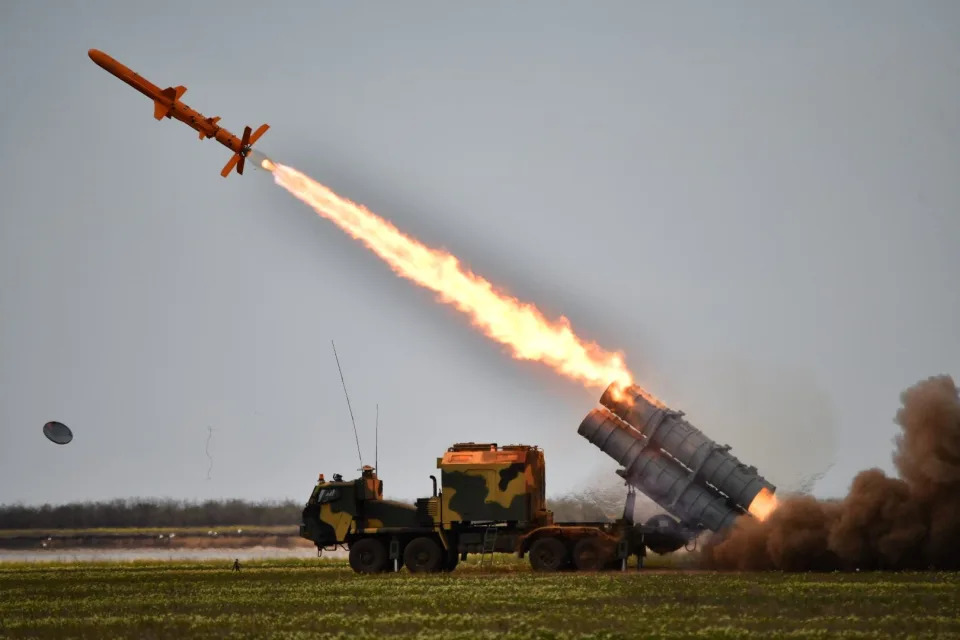
Ukrainian sailors leave the Konstantin Olshansky navy ship in the bay of Donuzlav, Crimea, on March 24, 2014. AP Photo/Pavel Golovkin
BUSINESS INSIDER: Ukraine fired a missile at the warship that Russia stole from the country a decade ago, Kyiv revealed, offering new details about a large attack on Moscow's Black Sea Fleet that unfolded over the weekend.
The Ukrainian defense ministry said on Tuesday that its forces used a homemade Neptune anti-ship missile to strike the Konstantin Olshansky. Russia had seized this decades-old landing ship, alongside much of Kyiv's navy, during its 2014 illegal annexation of the Crimean peninsula.
"Justice has been restored," the Ukrainian defense ministry wrote on social media.
For years, the Konstantin Olshansky was moored in southwestern Crimea's Sevastopol Bay as Russia dismantled it for parts, Ukrainian Navy spokesperson Dmytro Pletenchuk said on Tuesday. But Moscow eventually decided to restore the ship because it ran out of its own landing vessels.
Russia was planning to use the Konstantin Olshansky against Ukraine, Pletenchuk and Kyiv's defense ministry said.
"Therefore, it was decided to hit this vessel with our Neptune," Pletenchuk said, according to the Ukrainska Pravda newspaper. "It was definitely damaged. In any case, it is not combat-ready now."
The R-360 Neptune is a subsonic, long-range cruise missile designed by the Kyiv-based Luch Design Bureau. Ukraine has reportedly been working on an upgraded version of the munition, which has been used in the past to hit high-value Russian targets including the guided missile cruiser Moskva that was the Black Sea Fleet's flagship.
Ukraine on Sunday confirmed that it launched a huge missile attack on the port city of Sevastopol, home to the Black Sea Fleet, during the previous night, hitting two Ropucha-class landing ships, a naval communications center, and infrastructure facilities. Kyiv also revealed on Tuesday that it struck the Ivan Khurs reconnaissance ship, in addition to the Konstantin Olshansky.
Russian President Vladimir Putin's "continued illegal occupation of Ukraine is exacting a massive cost on Russia's Black Sea Fleet," UK Defense Minister Grant Shapps wrote on social media after the attack, calling the fleet "functionally inactive."

A test of a Neptune missile in April 2020.General Staff of the Armed Forces of Ukraine
Indeed, Ukraine has compensated for its lack of a proper navy by using long-range cruise missiles — specifically, Western-provided Storm Shadow/SCALP-EG variants — and locally produced exploding naval drones to wreak havoc on the Black Sea Fleet.
Throughout the full-scale conflict, Ukraine has relied on this asymmetric style of warfare to take out roughly a third of the Black Sea Fleet, force some of Moscow's warships to relocate away from vulnerable Crimea and closer to mainland Russia, in the process opening up a maritime corridor for the grain exports crucial to its economy.
"I am grateful to all of our heroes who destroy enemy logistics in the occupied territories. Those who clear Crimea and the Black Sea of the occupiers' presence," Ukrainian President Volodymyr Zelenskyy said in an address to the nation on Sunday.
"This is a difficult task, but our warriors are completing it step by step," he added. "Everyone sees it."












Leave a review